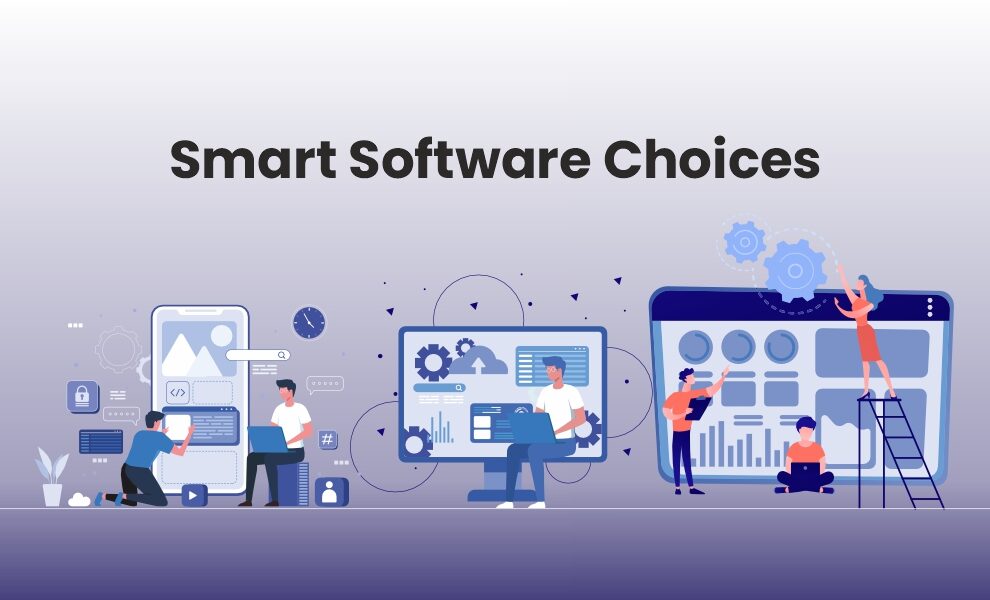In today’s fast-paced business environment, optimizing operations is critical for sustained success. By carefully choosing the right software, businesses can automate processes, improve communication, enhance decision-making, and ultimately increase productivity. Here’s how smart software choices can transform daily operational flow.
Automating Routine Tasks
One of the most significant advantages of using the right software is automation. Many routine tasks that once took up valuable employee time, such as data entry, scheduling, or inventory management, can be automated with the help of smart software.
For instance, project management software like Trello or Asana can automate reminders, task assignments, and status updates, ensuring that everything runs smoothly without requiring constant oversight. Similarly, accounting software like QuickBooks can handle invoicing, payroll, and financial reporting automatically, saving time and reducing the likelihood of mistakes.
Enhancing Communication and Collaboration
Effective communication is at the heart of any successful organization. Smart software solutions, such as team collaboration tools like Slack or Microsoft Teams, ensure that communication is seamless and real-time. These platforms allow teams to share files, exchange ideas, and coordinate on projects, regardless of location, fostering a more collaborative work environment.
For brainstorming sessions or visualizing strategies, teams can quickly create a mind map to organize ideas and clarify complex information, making collaborative planning more efficient. Leveraging such tools helps streamline processes while keeping everyone aligned on project goals.
Moreover, customer relationship management (CRM) software like Salesforce or HubSpot helps businesses maintain strong connections with their clients by streamlining customer interactions, tracking important conversations, and automating follow-up tasks. With such software, employees can respond to client needs more quickly and effectively, improving customer satisfaction and loyalty.
Facilitating Data-Driven Decision-Making
Data is one of the most valuable assets any business can have, but raw data alone isn’t enough. To make informed decisions, businesses need the right tools to analyze and interpret this data. Smart software solutions designed for data analysis, such as Tableau or Power BI, can help businesses process vast amounts of data and generate actionable insights.
With these tools, businesses can track key performance indicators (KPIs), identify trends, and gain a deeper understanding of their operations. This data-driven approach ensures that decisions are based on solid evidence, rather than gut feelings, leading to more effective strategies and better business outcomes.
For example, a company looking to optimize its marketing campaigns can leverage Click Insights to track website traffic, customer behavior, and SEO performance. This allows them to make data-backed decisions on content, timing, and target audiences, ultimately improving the success of their marketing efforts.
Streamlining Workflow and Reducing Bottlenecks
Another area where smart software choices can make a significant impact is workflow optimization. By implementing software that is tailored to specific business processes, companies can eliminate bottlenecks and ensure smooth operations. Workflow automation software like Zapier or Monday.com can be used to integrate different systems, ensuring that tasks move seamlessly from one stage to the next.
For example, a company using both a CRM system and an email marketing platform can use integration software to automatically add new contacts from the CRM into the marketing platform, reducing the need for manual data entry. This streamlined process not only saves time but also minimizes the potential for errors and delays.
Improving Customer Service and Satisfaction
In any business, customer service is a crucial component of success. The right software can help improve customer service by providing employees with the tools they need to respond to inquiries and resolve issues quickly. For example, customer support software like Zendesk or Freshdesk can help businesses track customer queries, prioritize tickets, and provide timely responses.
By improving response times and offering personalized solutions, businesses can enhance the customer experience. Additionally, customer feedback tools can gather insights into customer satisfaction, which can be used to make improvements in service delivery and product offerings.
Enhancing Scalability
As businesses grow, so too do the challenges of managing operations. The right software solutions provide scalability, allowing businesses to easily adapt to increased demand. Cloud-based software, such as Google Workspace or Dropbox, ensures that files and resources are accessible from anywhere, supporting a distributed workforce.
Furthermore, enterprise resource planning (ERP) systems like SAP or Oracle can scale with a company’s growth, integrating various functions such as inventory management, order processing, and human resources into a single, cohesive system. This scalability ensures that the company’s operations remain efficient and responsive, no matter how large the organization becomes.
Conclusion
The role of smart software in improving daily operational flow cannot be overstated. From automating routine tasks to enhancing communication, facilitating data-driven decision-making, and optimizing workflows, the right software can have a profound impact on business operations. By choosing the right tools, businesses can increase productivity, reduce errors, and ensure a more seamless and efficient operation.
Recommended For You:
Top Open Source ERP Tools Available for Businesses
How Low-Code and No-Code Platforms Are Changing Software Development


